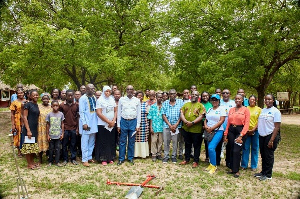 A group picture of members of the foundation and some farmers
A group picture of members of the foundation and some farmers
Some five mango-growing communities in the Greater Accra, Eastern, and Volta Regions, currently battling with water scarcity, can now heave sighs of relief following the groundbreaking ceremony to provide them with mechanized boreholes.
This facility, when fully operational, will bring significant relief to the people of the affected communities, who will be able to access good-quality water within their areas.
Manya-Jorpanya in the Greater Accra, Akwamu Apese in the Eastern, Adujor in the Volta Region, and two other communities have suffered from perennial water shortages over the years.
The communities have been relying on various alternative sources of drinking water for other purposes, including farming.
In some instances, residents also compete with animals for the same water.
The head and public relations officer of Blue Skies Foundation, Alistair Djimatey, explained that the motivation behind the project is to bring relief to thousands of affected rural dwellers, most of whom are mango producers and supply mangos to the Blue Skies company.
"This is a community where some of our farmers live, and they travel distances; they share water with cows, among other things, so we thought it wise to provide them with a mechanized borehole system to give them access to potable water so they can live healthily," said the PRO.
He hoped that the improved situation would serve as a catalyst to empower them and enable them to produce more for the country.
The five projects, to be executed at an average cost of GHC65,000 and expected to be completed within two months, will address the acute water challenges in the affected communities.
Emphasizing the need to facilitate the early completion of the facilities to bring relief to the people, Mr. Djimatey said, "Looking at the situation, I think it's more urgent for us to make potable water available to the community."
"The connection is our farmers; this is a farming community that grows a lot of mangoes, and we've realized that this whole area feeds the country with mangoes. Most of our farmers and their families live here."
Mr. Djimatey disclosed that the Blue Skies Foundation has, over the past fifteen years, embarked on about 158 corporate social responsibility initiatives, including building schools, health facilities, sanitation facilities, etc., in several deprived communities nationwide.
The PRO also expressed concern over the rapid environmental degradation and loss of arable land in the Shai Osudoku area.
Expressing worry over the situation, he noted, "We've lost more arable land over the past ten years than we have in the past century, and looking at the trend now, if nothing is done about our land tenure system, I'm sure we'll lose more in the next ten years."
He urged policymakers to prioritize safeguarding the country's lands for farming activities.
The Assemblyman for the Abiete Electoral Area, Kingsley Obu, said the water facility is a critical need for the people, adding that the completion of the project would serve as a great relief for them.
He was optimistic that the mechanized borehole would go a long way in addressing the perennial water scarcity faced by the community.
Mr. Obu thanked the Blue Skies Foundation for their support but requested more assistance to meet the rising needs of the expanding community.
A mango farmer in Manya-Jorpanya who supplies Blue Skies with his produce, Mr. Seth Djanmah, expressed relief at the project, as water scarcity has been a major challenge in the community.
He identified the underlying cause as frequent burst pipes and long periods of water shutdown.
He said the situation affected the domestic and social lives of the people and expressed the community's gratitude to the fruit processing company for their generosity.
Since its launch in 2009, the Blue Skies Foundation has funded some 158 projects that have impacted the lives of its beneficiaries.